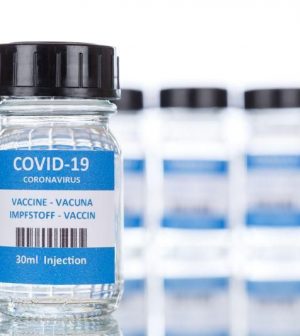- Could Your Grocery Store Meat Be Causing Recurring UTIs?
- Are You Making This Expensive Thermostat Error This Winter?
- Recognizing the Signs of Hypothyroidism
- 10 Strategies to Overcome Insomnia
- Could Artificial Sweeteners Be Aging the Brain Faster?
- Techniques for Soothing Your Nervous System
- Does the Water in Your House Smell Funny? Here’s Why
- Can a Daily Dose of Apple Cider Vinegar Actually Aid Weight Loss?
- 6 Health Beverages That Can Actually Spike Your Blood Sugar
- Treatment Options for Social Anxiety Disorder
Updated COVID Vaccines Will Roll Out Mid-September, Officials Say

New COVID-19 booster shots, reworked to target variants circulating now, could be available by mid-September.
The U.S. Food and Drug Administration is expected to approve them in a few weeks, CNN reported, citing unnamed senior administration officials.
The U.S. Centers for Disease Control and Prevention will soon follow with a safety review and its recommendations. Its Advisory Committee on Immunization Practices is scheduled to meet Sept. 12.
This will be an opportunity for people to boost waning antibodies to the virus. Just about 17% of those who were eligible to receive last fall’s bivalent COVID shots got them, CNN reported.
Americans are expected to be able to choose between two mRNA vaccines made by Pfizer and Moderna, as well as a protein subunit vaccine from Novavax.
The Novavax vaccine contains an ingredient to boost the immune system to make antibodies, CNN reported.
The FDA plan is to approve the Pfizer and Moderna vaccines for people ages 12 and up. It is expected to allow the Novavax vaccines, as well as vaccines for those age 11 and younger, under an emergency use authorization, CNN reported.
The new vaccines will target the XBB.1.5 coronavirus subvariant and offer some protection for closely related strains. They are also effective against EG.5.
There will not be free government coverage, though most insurance plans are required to pick up the full cost, without copays, under the Affordable Care Act.
People with no insurance can use a government bridge program to get vaccines for free.
“That bridge program will exist through a few channels,” CDC Director Dr. Mandy Cohen said in an interview with CNN. “Folks can go to a federally qualified health center or they can go to their public health department. … And then the third option is, we are working with pharmacy partners such as CVS, Walgreens, Walmart and others to have it available in the pharmacies as well.”
There may be a slight delay in getting free vaccines at stores, but health departments should have them right away.
The National Stockpile also still has COVID tests and continues to send them where they’re needed.
The news about the booster comes at a time when COVID cases on the rise, as seen in emergency room visits, hospitalizations, testing of travelers at airports and wastewater monitoring.
Right now, more than 12,000 Americans are hospitalized with the virus. That’s up 22% in the most recent week, CNN reported.
Immunity from previous vaccines and infections has kept that number of COVID cases to about one-third of what they were last summer at this time.
More information
The World Health Organization has more on the current state of COVID-19.
SOURCE: CNN, Aug. 25, 2023
Source: HealthDay
Copyright © 2026 HealthDay. All rights reserved.










